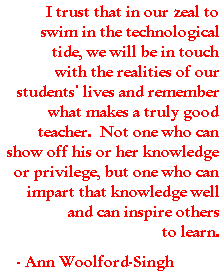
Perhaps the most difficult issue for computers-and-writing folks to confront head-on is access to technology. What we do requires outlays of time and money--especially money. During the Epiphany Institute workshops and small-group meetings, access to technology was the most undertheorized aspect of our discussions, although it has since begun to take on a more significant role in post-institute discussions. On the last day of the conference, Ann Woolford-Singh made an impassioned plea to participants to take note of the racial makeup of the participants: mostly white. Following that, participants began discussing the issues surrounding equitable access to technology in a democratic society. Ann's remarks from the Richmond Institute appear here, in their entirety:
Before my attendance at the Epiphany Institute, I was uncertain, filled with conflict, about my using computers in my classes. I had always been technophobic, probably because of my upbringing. Every time something broke down at home, my mother, a strong, independent woman in numerous ways, instantly became helpless and called for my father, who didn't often appear to know what he was doing but was comfortable trying, free to swear, fiddle, and sometimes utterly ruin what he had set out to fix. Like mother, I watched and internalized the unfortunate notion that as woman I had many strengths but fixing mechanical things was not one of them. In fact, it was downright unnatural and unnecessary for me to have any working knowledge of machinery except how to turn it on and off.
 Not only did I need technology for personal use, I also needed it for instruction. As teacher, I
must break out of the female stereotypical bonds and at the same time face another dimension - a
racial one. I am one of the three percent of African-American college teachers in the U.S. and in
spite of this disproportionate percentage (African
Americans are about twelve percent of the population), I am often perceived as having been hired
because of affirmative action. For many students and colleagues alike, affirmative action is
synonymous with incompetence - another unfortunate notion. I, then, must always enter a
classroom with a lot of self-confidence to combat hundreds of years of negative perceptions. I do
not have the profile that allows students to be forgiving when chaos and unpredictability,
necessary elements in a computer-assisted classroom, prevail. So, how do I rise to the
challenge?
Not only did I need technology for personal use, I also needed it for instruction. As teacher, I
must break out of the female stereotypical bonds and at the same time face another dimension - a
racial one. I am one of the three percent of African-American college teachers in the U.S. and in
spite of this disproportionate percentage (African
Americans are about twelve percent of the population), I am often perceived as having been hired
because of affirmative action. For many students and colleagues alike, affirmative action is
synonymous with incompetence - another unfortunate notion. I, then, must always enter a
classroom with a lot of self-confidence to combat hundreds of years of negative perceptions. I do
not have the profile that allows students to be forgiving when chaos and unpredictability,
necessary elements in a computer-assisted classroom, prevail. So, how do I rise to the
challenge?
I will rise a step at a time or a leap (the Epiphany Institute, for example) at a time in spite of limited personal and professional resources. It is imperative for me to actively participate in the changes so that even when chaos and unpredictablity occur in my classes, my confidence will not be diminished. My experiences may even help me become a better teacher.
 If I have such immense challenges with technology in school, what then for a forty-something
African-American female student who finally enters the college classroom? She may be a single
parent, low-wage earner with below-average academic skills who enrolls with high aspirations in
a community college. She may have to face the reality that in order to succeed in one class, she
will have to spend countless hours mastering the course content as well as the technological
means through which that content is presented and interpreted. She may have the potential to be
another Maya Angelou or Rita Dove, but would she realistically have the time to get there if the
computer becomes another economic and psychological barrier insidiously placed in her way,
whether or not the teacher's intentions were admirable.
If I have such immense challenges with technology in school, what then for a forty-something
African-American female student who finally enters the college classroom? She may be a single
parent, low-wage earner with below-average academic skills who enrolls with high aspirations in
a community college. She may have to face the reality that in order to succeed in one class, she
will have to spend countless hours mastering the course content as well as the technological
means through which that content is presented and interpreted. She may have the potential to be
another Maya Angelou or Rita Dove, but would she realistically have the time to get there if the
computer becomes another economic and psychological barrier insidiously placed in her way,
whether or not the teacher's intentions were admirable.
| Formats | Themes | Leaders | People |
Send comments on these pages to: Claudine Keenan
![]()